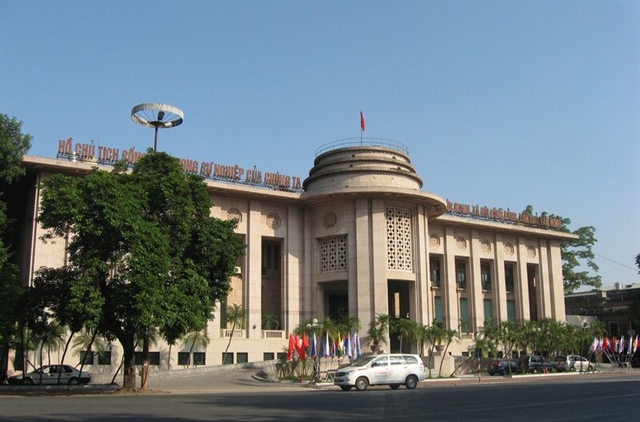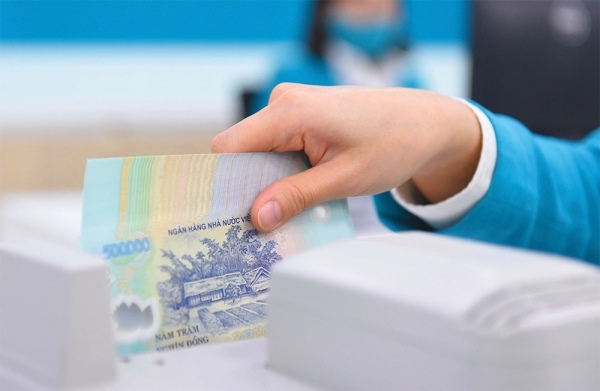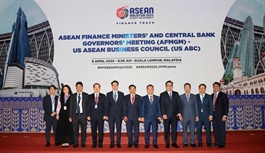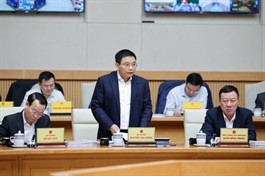MoF seeks business proactivity in ESG
MoF seeks business proactivity in ESG
The Ministry of Finance is assisting enterprises in practising environmental, social, and governance considerations in order to improve their competitiveness.
To support enterprises in preparing reports on environmental, social, and governance (ESG) criteria, the ministry (MoF) in late March coordinated with partners to launch a handbook. The book provides sustainable practice guidance for enterprises in the priority industries of finance, real estate/construction, and manufacturing, which have a significant impact on the environment.

MoF seeks business proactivity in ESG |
Through the handbook, businesses can access guidance and reference practices to incorporate relevant factors into their governance and operational strategies. Thereby, businesses can improve their capacity to respond to risks and take advantage of opportunities related to sustainable development; disclose information to ensure compliance with legal requirements and lead domestic and international practices; and minimise risks and take advantage of opportunities that ESG brings, especially access to green financial resources.
At a workshop in late March on a framework for ESG reporting held by the Agency for Private Enterprises Development under the MoF, agency deputy director-general Nguyen Duc Trung said, “Implementation is an urgent requirement to improve competitiveness, attract international investment, expand export markets, and meet community expectations.”
He added that there is an increasing consumer trend of focusing on green and sustainable products, especially from young people, while application of ESG in business activities not only brings benefits to enterprises but also contributes to Vietnam’s goal of net-zero emissions.
However, a 2024 survey from the agency on sustainable business practices reported that in terms of awareness, ESG is still a new concept, especially for small- and medium-sized enterprises (SMEs). Of the 1,019 enterprises involved in the survey, 39 per cent had never heard of the ESG concept, and 62 per cent were not clear about Vietnam’s related regulations and policies.
In terms of practice, only 14 per cent of respondents are pioneers in ESG practices, and one-quarter of enterprises do not implement or have few activities related to it. Social content is being carried out most in SMEs, followed by governance and then environmental efforts.
SMEs show little interest in ESG, with less than 30 per cent taking initial steps in implementation. They cite challenges such as a lack of information, lack of training or introduction programmes, and a lack of specific policies from the government.
At another workshop on greening practices in production and consumption in Ho Chi Minh City also in March, Dang Thanh Tu, head of Sustainable Development at Eurofins Sac Ky Hai Dang, said investors believe that risks related to ESG can affect reputations. Eurofins Sac Ky Hai Dang is a member of Eurofins Scientific Group, which provides testing and laboratory services for genomics, forensics, and more.
“This is in addition to assessing the financial factors of a business,” he said. “For example, when a fund invests $1 million in a coffee production company but then discovers that this company produces coffee on deforested land or uses child employees, the investor’s reputation is immediately reduced. Therefore, investors are paying more attention to evaluating how the business’s operations affect the surrounding community and ecosystem,” Tu said.
The biggest goal of integrating ESG into enterprise development, according to Tu, is to build brand image, comply with export market regulations, build a solid governance structure, optimise resources, and pull in investment. But not every enterprise can carry this out.
“ESG disclosure in Vietnam is not yet mandatory, there are only regulations on ESG disclosure in annual reports. In Vietnam, ESG is mentioned a lot, but only large enterprises with strong financial potential can spend money on it,” Tu said.
Fergus McBean, first secretary for Climate and Nature at the British Embassy to Vietnam, said ESG is one of the key factors shaping the strategies of firms and investment funds.
“Practising ESG helps Vietnamese businesses meet the requirements of financial institutions and international markets, especially the United Kingdom and the European Union,” he said. “Both markets have plans to introduce measures requiring Vietnamese businesses to report on ESG and climate-related measures they have carried out.”
While some businesses have been more proactive in practising ESG, McBean added that others say they lack support for reporting.
“This affects the ESG practice process of the business sector, and the opportunities to access green finance and penetrate deeper into the global market of Vietnamese enterprises,” he explained.
- 09:49 11/04/2025



























